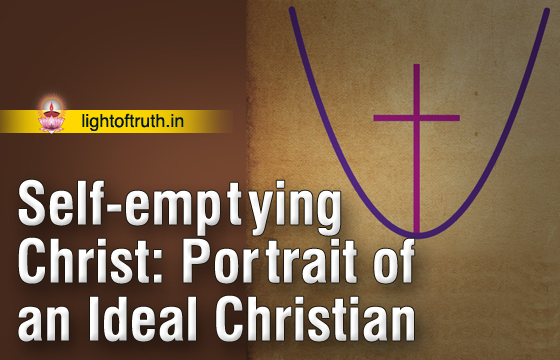Azadi ka Amrit Mahotsav Kolkata event honours four Clergymen
Pope Francis asks businesses to support working women: They’re ‘afraid to get pregnant’
Study: Christianity may lose majority, plurality status in U.S. by 2070
Indian politician declines Magsaysay Award under party pressure
Like John Paul II, Pope Francis heads to Kazakhstan during time of war

Benny Nalkara, CMI

The letter to the Philippians has had a greater influence in theology, largely because of the significant ideas expressed in the hymn (2:6-11). Paul’s intention was to present the portrait of an Ideal Christian. More than handling the issues like divinity and humanity of Christ, Paul spells out the way in which those who are in Christ ought to live. It is said that the passage was interpreted in course of time in a way never intended by Paul. More than focussing on what Christ is, Paul’s attempt is to project the implications for the lives of those who acknowledge Christ as Lord.
The Letter to the Philippians was written in a context where the Church of Philippi underwent some threats of disunity and lack of harmony. Paul’s relationship with the church at Philippi had been warm and cordial. Although he had been imprisoned on his first visit there (Acts 16:11-40), it was the first church founded in Europe. The initial success there was fondly recalled by Paul (Phil. 1:3-5). The church had continued to support Paul in his missionary efforts (4:15-18). Paul is now in perilous circumstances. The gospel that he has preached faithfully being threatened by self-serving, ambitious preachers (1:15-17; 2:20-21; 3:18-19.
The love, compassion, and sense of community that come from Christ are used here as a basis for a renewed appeal for unity (the same mind-set, the same love, united in spirit, of one purpose). The problem in the Philippian community is revealed to be selfishness and arrogance (v. 3). Internal dissension is threatening the love, unity, and fellowship of the community (cf. 2:14; 3:18-19; 4:2). The solution is understood by Paul to be a proper ordering of one’s life. Priorities must be made according to a set of values that places the welfare and interests of others above concern for self (2:3-4); a humility arising from the very nature of being Christian. Need of harmony among the Christians is emphasized by Paul. According to him there s
hould not be any question of selfish ambition. Regard others as better persons. Look for the interests of others.
A call to altruism in the form of humility is stressed in the hymn (2:6-11). The need of having the “frame of mind which Jesus himself had” is highlighted through the kenosis hymn. Christ who was in the form (morphe) of God having his right to the glory of God (kabod). But he did not hold on to it. He emptied himself (kenosis) and took the form (morphe) of the slave (doulos). According to Aristotle, in the Greco-Roman World, the slave was considered as a “living tool.” So such “inhuman” was his incarnation. And the self-emptying act of Jesus reached the climax in the death, and in the death on the cross. The second part (2:9-11) is about the glorification given to the humiliated Christ. “Jesus Christ is Lord” is one of the earliest Christological confessions. That confession again is to give glory to the Father.
Christ is presented as a perfect model for any Christian. He is also the source of the new life. The Christological hymn of 2:6-11 is of great religious and cultural importance, especially in the field of hymnological research in the early Church. Its use of language and content is quite unusual for St Paul, leading one to think that here he may have used a pre-existent text5 (c. 30-55AD), hence we can find out just how the first generation of Christians prayed.
The Church needs the unity of mind and purpose to which Paul is calling the Philippians. It needs a unity built around servant-hood, a servant-hood illustrated by the emptied Christ. Perhaps the Church needs to see itself in a new light. Maybe it needs to see itself less as the proclaimer and defender of divine truth, and more as the servant of humanity, the foot washer who expresses his love by humble service. It highlights a mind-set different from others. It meant a commitment to servant-hood, a life poured out in service to others, totally emptied of self.
We live in a society dominated by the claims for rave, permeated with the philosophy of “me first,” and moulded by the corporate ideals of efficiency and success. The Church must be called to remember that demanding one’s rights and privileges may be popular, even necessary in some cases, but if it does so at the expense of Christian unity and love, it is not Christian! The Body of Christ must be called upon to refocus on Christian humility, unity, and fellowship. We must make service to others, perfect love in action, our primary responsibility. An attitude of Christ like humility does not demand rights or protect its own interests; it seeks servant-hood.
The Church needs a unity built around servant-hood, a servant-hood illustrated by the emptied Christ.
Leave a Comment